The Beverage Section In DIYFIT Nutrition
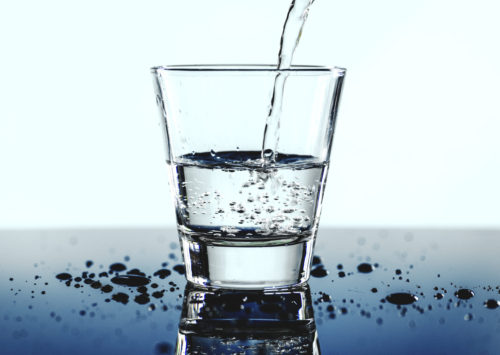
The Beverage Section, Water and it's importance to DIYFIT Nutrition
The beverage section in DIYFIT Nutrition program is your next step. We recommend your beverage of choice at meals and between should be water. As a minimum, drink eight-8 oz glasses of water each day. On days when you exercise, be sure to adequately hydrate before, during and after to replenish fluid losses. As a rule of thumb, drink 8-10 oz 10-15 minutes before exercise, 8-10 oz every 10-15 minutes during exercise, and 20-24 oz in the hour after exercise.Water is an essential ingredient to a healthy life. Some of the many important functions of water include the following:
- Transports nutrients throughout the body and assists with elimination of waste
- Lubricates joints and tissues
- Regulates body core temperature
- Facilitates digestion
- Satiety aid – helps you feel full!
If you have difficulty drinking water, try some of these tips:
- Add lemon or lime
- Use sugar-free drink mixes such as Crystal Light to add flavor
- Drink at room temperature (easier to drink more)
- Keep a water bottle with you at all times
- Always pour a glass at meal time
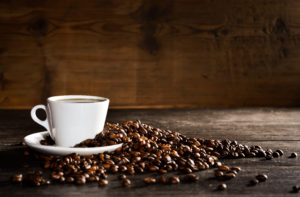
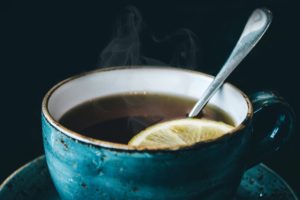
Coffee/Tea in the Beverage Section
Caffeinated beverages are acceptable to consume in moderation. Caffeine may actually have a diuretic effect on the body (especially when consumed in large amounts), so now if the time to kick the pot-a-day habit if you have one. After all, we’re trying to prevent dehydration! Try to limit caffeinated coffee/tea to 6 oz/day or less, or consider switching to decaf. Decaffeinated herbal teas, particularly decaffeinated green tea, may actually have health benefits due to the antioxidants it contains. Be careful what you put in that coffee or tea though – limit or eliminate sugar and cream.
The Fruit Juice Option in the Beverage Section
Fruit juice packs the same caloric punch that whole fruits do, however leaves out most of the beneficial fiber. A mere 4 oz of juice provides as many calories as a small apple, except you get none of the fiber and all of the fruit sugar. 100% fruit juice will contain healthful vitamins, but it is still best to eat whole fruits rather than drink the juices. With whole fruits, you get all the vitamins and minerals, and the benefit of the fiber.
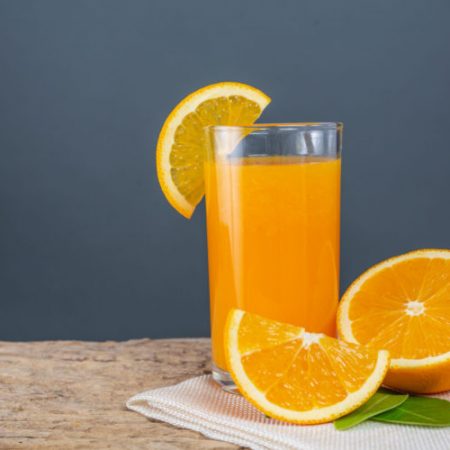
Soda as a Beverage Option in the DIYFIT Nutrition Program
Soda, including diet soda, is best to limit on your meal plan. Regular soda contains massive amounts of sugar, provides zero nutrient value, and often contains caffeine (as we’ve already covered, may have a diuretic effect on the body). Diet sodas contain sugar substitutes (or artificial sweeteners), which are food additives and best used in moderation. In addition, recent studies have actually linked artificial sweeteners to weight gain. The sweet taste from the sweetener has been found to cause an insulin response, which can lead to a craving for more food intake at the next meal, eventually resulting in weight gain. Again, your beverage choice should be water as much as possible.
The Beverage Section Option of a Sports Drink
Sports drinks are great for re-hydration, as well as for replenishing electrolytes and carbohydrates lost during exercise. Staying hydrated and replacing electrolytes prevents fatigue during exercise, and since carbohydrates are the primary source of fuel during exercise, they’re crucial for optimal performance. Sports drinks do contain a fair amount of calories and sugar, so be sure to reserve their consumption for exercise sessions. Try a Propel for a good low-calorie sports drink alternative.
Energy Drinks in the DIYFIT Nutrition Program Beverage Section
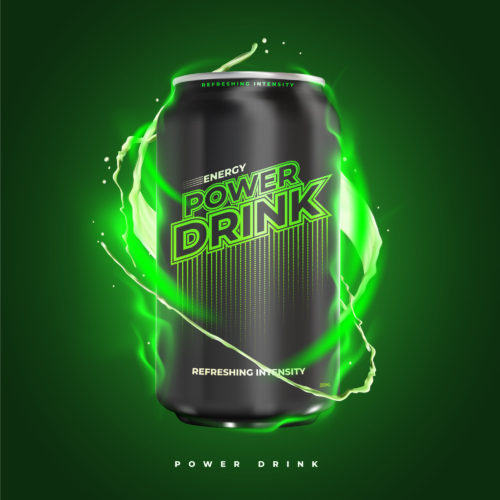
Energy drinks (Amp, Rockstar, Monster, Red Bull) typically provide high amounts of caffeine, vitamins, and herbal supplements. The combined ingredients may work to provide a stimulant effect, or lead to increased energy. However, some energy drinks contain a high amount of sugar and may even lead to unpleasant side effects for some individuals. Diet varieties are available, which will decrease the sugar content, however adverse side effects may still occur. Adverse effects may include nervousness, irritability, sleeplessness, increased urination, abnormal heart rhythms, and stomach upset. It is best to, again, consume in moderation if you choose to include energy drinks in your daily routine (< 1 drink/day, 5 days/week).
Alcohol in the Beverage Section of the DIYFIT Nutrition Program
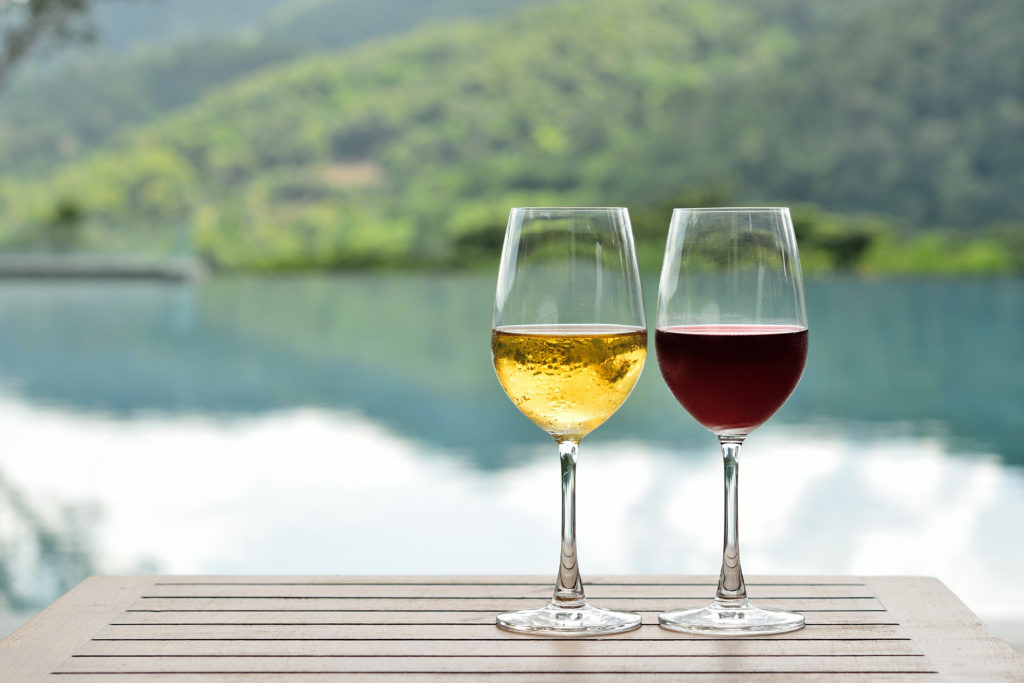
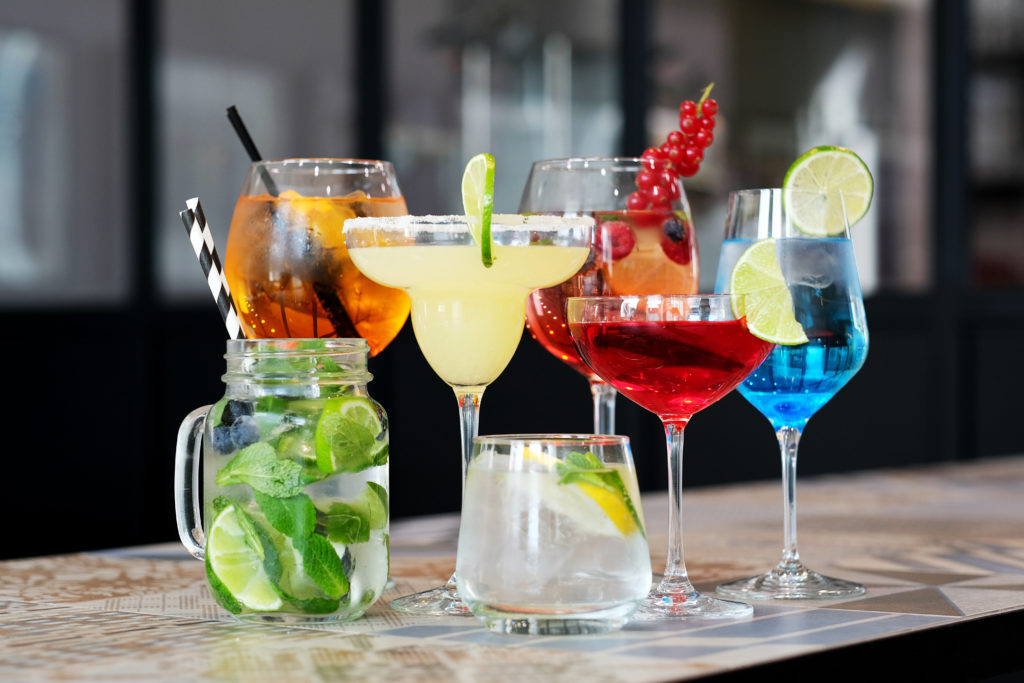
- Those who choose to drink alcoholic beverages should do so sensibly and in moderation—defined as the consumption of up to one drink per day for women and up to two drinks per day for men.
- Alcoholic beverages should not be consumed by some individuals, including those who cannot restrict their alcohol intake, women of childbearing age who may become pregnant, pregnant and lactating women, children and adolescents, individuals taking medications that can interact with alcohol, and those with specific medical conditions.
- Alcoholic beverages should be avoided by individuals engaging in activities that require attention, skill, or coordination, such as driving or operating machinery.
Calories in Selected Alcoholic Beverages
This table is a guide to estimate the caloric intake from various alcoholic beverages. An example serving volume and the calories in that drink are shown for beer, wine, and distilled spirits. Higher alcohol content (higher percent alcohol or higher proof) and mixing alcohol with other beverages, such as calorically sweetened soft drinks, tonic water, fruit juice, or cream, increases the amount of calories in the beverage. Alcoholic beverages supply calories but provide few essential nutrients.
| Beverage | Example Serving Volume | Approximate Total Calories* |
| Beer (regular) | 12 oz | 144 |
| Beer (light) | 12 oz | 108 |
| White wine | 5 oz | 100 |
| Red wine | 5 oz | 105 |
| Sweet dessert wine | 3 oz | 141 |
| 80 proof distilled spirits (gin, rum, vodka, whiskey) | 1.5 oz | 96 |
*The total calories and alcohol content vary depending on the brand. Moreover, adding mixers to an alcoholic beverage can contribute calories in addition to the calories from the alcohol itself.
Some standard “mixers”:
- Juice – 4 oz provides an additional 60 calories
- Tonic – 4 oz provides an additional 45 calories
- Coke/Sprite – 12 oz provides an additional 140 calories
- Prepared mixers – read label closely (pay attention to serving size and corresponding calories); expect to add quite a few calories!
Calorie counts of common alcoholic drinks (standard serving sizes):
4 oz champagne = ~90 calories
Bloody Mary = ~123 calories
Vodka Collins = ~175 calories
Vodka and cranberry = ~172 calories
Daiquiri = ~314 calories
Rum and Coke = ~182 calories
Rum and diet Coke = ~133 calories
Margarita = ~327 calories
Long Island iced tea = ~275 calories
Gin and tonic = ~178 calories
Martini = ~175 calories
Whiskey sour = ~175 calories
Amaretto sour = ~ 421 calories
Cosmopolitan = ~131 clories
Hurricane = ~ 384 calories
Mai Tai = ~ 306 calories
Pina Colada = ~ 410 calories
Screwdriver = ~ 208 calories
Most important to remember: alcohol is empty calories! Choose to spend your calories wisely (don’t drink your calories). Moderation is key!
If including alcohol, count as fat servings on your meal plan. Drink the alcohol with food rather than by itself.
